 Petzlover
Petzlover Basset Artesien Normand is originated from France but Bergamasco is originated from Italy. Basset Artesien Normand may grow 26 cm / 10 inches shorter than Bergamasco. Basset Artesien Normand may weigh 18 kg / 39 pounds lesser than Bergamasco. Both Basset Artesien Normand and Bergamasco has same life span. Basset Artesien Normand may have less litter size than Bergamasco. Basset Artesien Normand requires Low Maintenance. But Bergamasco requires Moderate Maintenance
Basset Artesien Normand is originated from France but Bergamasco is originated from Italy. Basset Artesien Normand may grow 26 cm / 10 inches shorter than Bergamasco. Basset Artesien Normand may weigh 18 kg / 39 pounds lesser than Bergamasco. Both Basset Artesien Normand and Bergamasco has same life span. Basset Artesien Normand may have less litter size than Bergamasco. Basset Artesien Normand requires Low Maintenance. But Bergamasco requires Moderate Maintenance
 The Basset Artesien Normand hails from Normandy, France. He was bred around the middle ages and was a popular breed with the royalty of France when they met for hunting with hounds. How the Basset was developed isn’t known, but in the 1800s the dog’s popularity grew, and Napoleon himself was a fan. With some people wanting hunting skills in their dog, others good looks and some wanting a heavier dog, the Basset Artesien Normand or the BAN emerged.
The Basset Artesien Normand hails from Normandy, France. He was bred around the middle ages and was a popular breed with the royalty of France when they met for hunting with hounds. How the Basset was developed isn’t known, but in the 1800s the dog’s popularity grew, and Napoleon himself was a fan. With some people wanting hunting skills in their dog, others good looks and some wanting a heavier dog, the Basset Artesien Normand or the BAN emerged.
Some people believe that the Basset came from a mix of French hounds crossed with smallish breeds such as Beagles and Dashshunds.The truth is that the Basset’s origin is up for debate, but the Basset Artesian Normand took over in popularity from the Basset Normand and the Basset Chien d’Artois. These dogs are now extinct.
The first record of Bassets in America came from the 1700’s when a number of Bassets were presented to George Washington as gifts. It is uncertain what type of Bassets they were, but quite likely they were Basset Artesian Normands. The breed club was established in 1910 and given its present name in 1924. The dog is also recognized by the United Kennel Club in the Scenthound group.
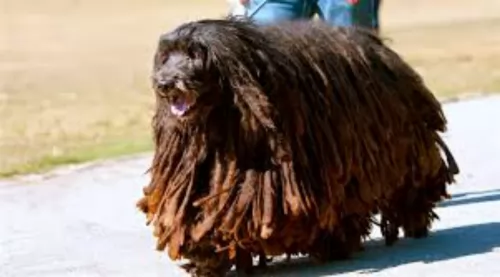 The Bergamasco comes from northern Italy. This medium sized sheepdog is of ancient origin. Known as an Italian sheep herding breed, his name actually comes from the town where he comes from - Bergamo.
The Bergamasco comes from northern Italy. This medium sized sheepdog is of ancient origin. Known as an Italian sheep herding breed, his name actually comes from the town where he comes from - Bergamo.
It was after World War II that there was danger that this breed would disappear as the need for herding and shepherding was diminishing. An Italian breeder, however, Dr. Maria Andreoli, stepped in to save the breed.
It was in 2015 that the American Kennel Club also changed the breed’s status from Miscellaneous to the Herding Group.
 The BAN is a small to medium sized dog, between 30 and 36 cm and weighing anything up to 20kg. He is low maintenance in terms of his short coat which is tri-colored – fawn, white with a black patch across the back. He has a long tail which is often held in an upright position. You can’t miss those long ears, which are a distinctive feature of this gentle, good-natured dog and which are low-set on the head. Add to that the dark, soulful eyes and you get a look that ‘wouldn’t hurt a fly.’
The BAN is a small to medium sized dog, between 30 and 36 cm and weighing anything up to 20kg. He is low maintenance in terms of his short coat which is tri-colored – fawn, white with a black patch across the back. He has a long tail which is often held in an upright position. You can’t miss those long ears, which are a distinctive feature of this gentle, good-natured dog and which are low-set on the head. Add to that the dark, soulful eyes and you get a look that ‘wouldn’t hurt a fly.’
The BAN is very similar to the regular Basset Hound but he is much slimmer. This is also because although he is a companion, he was at first a hunting canine, and is fit and muscular when fed the correct diet.
The Basset Artesien Normand is a friendly, affectionate dog, becoming a beloved pet of the family that he loves to be with. His gentle nature means that he won’t score high as a guard dog. He is gentle and affectionate with children in the home, and with some training and socialization he gets on well with other pets in the family. They’re fairly intelligent and you’ll be able to train him to carry out some important commands. As a hound, he tends to want to wander, and it is always a good idea to have him on a leash when out and about with him.
This breed of dog will need a good amount of exercise and other activities, even if it means climbing onto the couch and watching a movie with you. He can’t be left in the garden day after day on his own, and you’ll need to take him on daily walks and give him a game. Exercise is of particular importance for a dog like this, as he can easily put on weight and battle with back problems.
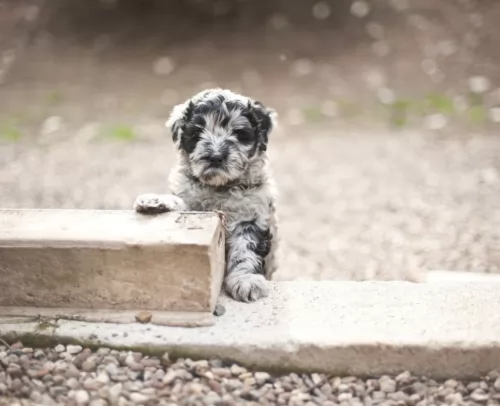 This medium sized sheepdog stands 54 – 62cm in height and weighs up to 38 kg as an adult. It is his coat which draws the most attention. It is of a coarse texture and actually greasy to the touch. It actually forms into strands or almost like dreadlocks from the top of the body, so that people agree he is one of shaggiest dog breeds there are.
This medium sized sheepdog stands 54 – 62cm in height and weighs up to 38 kg as an adult. It is his coat which draws the most attention. It is of a coarse texture and actually greasy to the touch. It actually forms into strands or almost like dreadlocks from the top of the body, so that people agree he is one of shaggiest dog breeds there are.
From age 1 on the coat starts to become woolly, and then the flocks start to form. As these clumps of hair appear, it will become necessary to separate them into smaller cords by hand to ensure attractive formation Brushing isn’t necessary but a big toothed comb can keep their hair ‘groomed’.
The colour of the coat is solid grey with patches of shades of grey and sometimes black. His dense, heavy coat makes it that he is suited to cooler climates. Because he is a herding dog, he wouldn’t do well in an apartment but would suit a home with a large garden.
He is intelligent and social but will need firm handling as he is a boisterous dog. He has a muscular yet compact body with a large head, long tail, high-set semi-drooping ears and large, gentle looking brown eyes. Although not instinctively aggressive, he makes an excellent watch dog with strong protective instincts to protect his human family.
He views new people into his circle with suspicion and wariness. He is good with kids and pets in the home and is playful and energetic.
 The Basset Artesien Normand is such a family friend with his docile personality. Short of stature, he has a keen sense of smell, much like the Bloodhound. With his short, smooth coat, he won’t require much from you in terms of grooming. His long ears, his sad eyes and his outward turned paws are all characteristics which endear him to dog lovers.
The Basset Artesien Normand is such a family friend with his docile personality. Short of stature, he has a keen sense of smell, much like the Bloodhound. With his short, smooth coat, he won’t require much from you in terms of grooming. His long ears, his sad eyes and his outward turned paws are all characteristics which endear him to dog lovers.
He doesn’t like to be left alone. This Basset is yours and he wants to be part of all the action in the house, and that includes meals. He has a hearty appetite, but you don’t want to be feeding him your scraps as he can put on weight quickly. This won’t be good for his health, and as a responsible pet owner, you need to be watching his weight.
Don’t forget his daily walk that he loves so much. Treat him with love and kindness and you’ll have yourself a happy, good-natured companion.
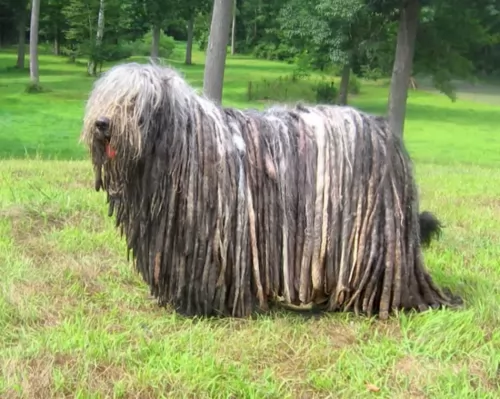 This is a working dog so they are naturally alert. He is also intelligent and independent and this independence is seen with training as he doesn’t take easily to following instructions, becoming stubborn. You’ll certainly want to have your Bergamasco socialized and trained as he can be a boisterous dog, bounding with energy.
This is a working dog so they are naturally alert. He is also intelligent and independent and this independence is seen with training as he doesn’t take easily to following instructions, becoming stubborn. You’ll certainly want to have your Bergamasco socialized and trained as he can be a boisterous dog, bounding with energy.
This is a dog that will need to be kept busy and provided with plenty of activities so that he remains happy, playful and relaxed.
Lively and intelligent, these dogs also form strong bonds with their owners and get on well with the children in the home. He will take well to country life as opposed to living in the city.
 The Basset Artesian Normand is a fairly healthy breed and you can expect him to reach 15 years, although you have to bear in mind that this breed is susceptible to some common health defects. As already mentioned, these long-bodied, short-legged dogs are prone to back problems. Weight gain is common in these dogs and additional weight will aggravate your dog’s back problems.
The Basset Artesian Normand is a fairly healthy breed and you can expect him to reach 15 years, although you have to bear in mind that this breed is susceptible to some common health defects. As already mentioned, these long-bodied, short-legged dogs are prone to back problems. Weight gain is common in these dogs and additional weight will aggravate your dog’s back problems.
While hip dysplasia is a genetic disease found more commonly in large dog breeds, it can also affect smaller breeds like the Basset. Your dog may develop a different way of walking and running and he may even resist movement as he can experience stiffness and pain in the rear legs. Hip dysplasia is mostly an inherited condition. Proper diet and exercise can help with preventing the disease.
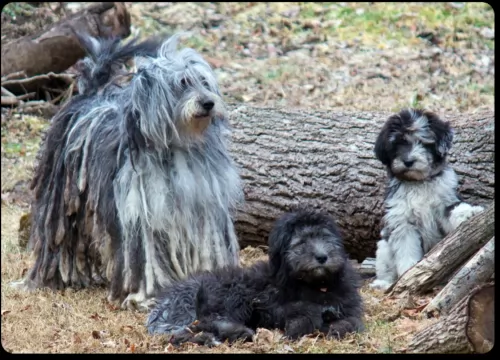 Your Bergamasco can live to be 13 to 15 years of age and he is considered to be a healthy breed. Nonetheless you want to be aware of health issues that are common to this breed
Your Bergamasco can live to be 13 to 15 years of age and he is considered to be a healthy breed. Nonetheless you want to be aware of health issues that are common to this breed
he is vulnerable to heat. He can die of heat exhaustion quicker than other breeds
keep an eye on him for hip dysplasia, progressive retinal atrophy and skin allergies
 The Basset Artesian Normand has a short, smooth coat and this will ensure that he is low maintenance. A regular brush twice a week will ensure you get rid of loose hairs.
The Basset Artesian Normand has a short, smooth coat and this will ensure that he is low maintenance. A regular brush twice a week will ensure you get rid of loose hairs.
Ear Infections - as is the case with long eared dogs, the Basset Artesian Normand is susceptible to ear infections. Check with your vet if you aren’t sure how to clean your dog’s ears so that you can prevent ear infections.
Brush your dog’s teeth about 2 or 3 times a week with special dog toothpaste- and brush. His nails will also need to be clipped regularly, more so if he doesn’t get to run on hard surfaces which wear the claws down.
You can speak to your veterinarian about wet- and dry dog foods and which type of food would suit your pet best. The type of food you give him, his age and his activity levels will be a guide on how to choose his food. Always make sure that a bowl of fresh, cool water is readily available to your 4-legged friend.
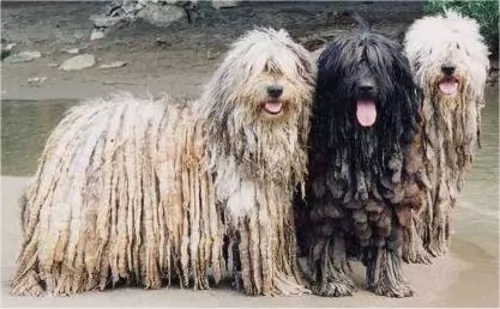 The Bergamasco isn’t a shedder but his coat will need to be combed once a week just to keep it in order. You don’t want to bath him too often, especially during the Winter as his coat takes a long time to dry. It isn’t recommended to shave a Bergamasco as the coat regulates the dogs temperature – keeping him warm and cold as the weather demands.
The Bergamasco isn’t a shedder but his coat will need to be combed once a week just to keep it in order. You don’t want to bath him too often, especially during the Winter as his coat takes a long time to dry. It isn’t recommended to shave a Bergamasco as the coat regulates the dogs temperature – keeping him warm and cold as the weather demands.
They thrive on a blend of kibble (dry) mixed with raw and-or moist food once or twice a day. Remember to include quality chicken, turkey, etc. mixed with some vegetables and rice into your dog’s diet. Ensure a constant supply of fresh water in an easily-cleanable bowl.
Balls and ropes are important for building muscle strength and burning energy. Remember your Bergamasco is a working breed and will need plenty of games and exercise.